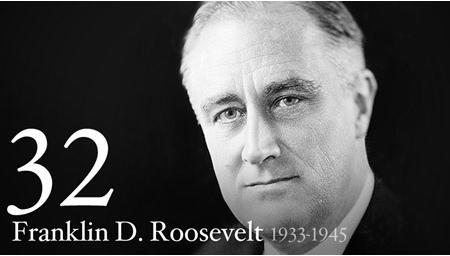President Franklin Delano Roosevelt and the Jews: Part One
by Ilana Rossoff, Reference Services Research Intern, Center for Jewish History

(This image is from the White House slideshow, “Our Presidents.”)
Franklin Delano Roosevelt is considered one of the most popular and accomplished presidents in American history. He pulled the U.S. economy into recovery from the Great Depression, contributed to orchestrating the defeat of the Nazi/Axis military campaign, and was reelected to serve four terms as president.
FDR was especially popular among American Jews. It is estimated that FDR earned 82% of the Jewish vote for presidency in 1932, 85% in 1936, and 90% in 1940 (see David G. Dalin and Alfred J. Kolatch’s The Presidents of the United States & the Jews). He was lauded for having appointed a significant number of Jewish officers to public positions despite the criticism he received from prominent and anti-Semitic figures such as Charles Lindburgh. The officers he appointed included Henry Morgenthau, Jr., the first Jewish Secretary of the Treasury, and Felix Frankfurter as Associate Justice in the Supreme Court. In addition, FDR had many close political associates who were Jewish, including Bernard Baruch, Samuel Rosenman, Stephen Wise (former president of the Zionist Organization of America and World Jewish Congress), and Justice Louis D. Brandeis.
Roosevelt grew sympathetic to Jewish issues, such as domestic anti-Semitism and the Zionist quest to establish a Jewish state in Palestine. However, the debate persists on the question of FDR’s response to the plight of European Jews and others in the Nazi genocide. This debate centers on the extent to which the President was responsible for the limited allowance of European Jews that could take refuge in the U.S., and whether he could have done more, earlier, to stop the systematic extermination campaign.
Historians who consider FDR in a favorable light point to his many efforts, both in the U.S. and on the international scene, to undermine the Nazi regime and provide relief to refugees. From early on, FDR’s rhetoric was boldly in opposition to the rise of the Nazi party and its military campaign across Europe.
In 1938, FDR established an Advisory Committee on Political Refugees to deal specifically with the crisis and act as a liaison to international efforts such as the Evian Conference. For this conference, FDR invited 32 countries to make plans to deal with the European refugee crisis. (Bolivia was one of the few countries that made significant shifts in their existing immigration quotas to accommodate the refugees.)
In early 1944, when more grave news came—and was publicly acknowledged—about the escalated extermination campaign by the Nazis, FDR issued an executive order to establish the War Refugees Board. This Board used private funds to provide direct relief to refugees and facilitate immigration. It was the largest and most effective effort by FDR, and it is credited with rescuing 200,000 Jewish and non-Jewish refugees (see Wyman’s Abandonment of the Jews, p. 285).
Visit the blog tomorrow to read part two of this article on FDR and the Jews! And, in the meantime, you can click here to search the collections.
